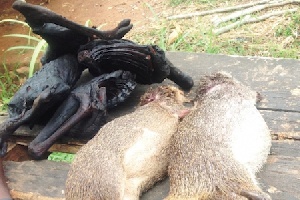The government has been urged to develop and implement policies that will support the livelihoods of bushmeat hunters and traders.
The recommendation comes in the light of a study, which found that there has been a decline in the hunting and trade of bushmeat since the outbreak of Ebola in 2014, compounded by the restrictions of the COVID-19 pandemic.
The outcome of the study was disseminated at a consultative meeting with some policymakers and key actors in the bushmeat industry, in Accra, on Wednesday, September 18.
The decline in the Ghanaian delicacy is attributed to stigmatisation and some environmental factors, including illegal mining (galamsey), chainsaw operation, and housing development in bushes.
The study was conducted by seven researchers from the Centre for Biodiversity Conservation and Research and other affiliated Departments of the University of Ghana, as well as some foreign universities.
The researchers divided the 16 regions into three zones – Northern, Middle and Southern, with a focus on three major bushmeat markets – Kantamanto (Greater Accra region), Atwemonom (Ashanti region), and Buipe (Savannah region).
Dr Fidelia Ohemeng, a Lecturer with the Department of Sociology, University of Ghana, noted that Ebola, worsened by the COVID-19 pandemic, negatively affected incomes, savings and investments, and households of bushmeat hunters and traders.
Specifically, she stated that the income levels of traders reduced by 87 per cent during the two-year study, with profit margins reducing by 91 per cent, while household budgets for school fees and utilities increased.
In an interview with the Ghana News Agency, Dr Ohemeng said it was important to prioritise policies for the intergenerational bushmeat industry, where recent zoonotic diseases had come from.
“About 70 per cent of all infectious diseases are now coming from animals, and it’s not going to be the last time that we’re going to see zoonotic diseases,” she said.
“So, there’s the need for the government to come up with programmes and policies that will help in the sustainability of the livelihoods of these hunters and women traders,” she stressed.
While encouraging hunters and traders to subscribe to insurance policies, Dr Ohemeng also asked them to form an association, which would champion their wellbeing and advocate policy support to the industry.
Madam Comfort Badu, the Queen mother of bushmeat traders at Atwemonom in the Ashanti Region, where bushmeat trade is highly concentrated, stated that her livelihood had been highly dependent on the trade.
She noted that the once profitable business, which she had been engaged in for more than 50 years, helped her to educate all her six children to tertiary level and asked the government to support the industry.
“There’s no single day that you won’t make sales from selling bushmeat, so it has been helpful to us, but since the outbreak of the Ebola, our businesses have been badly affected, because they said the animals were disease-infected,” she said.
She added that restrictions associated with the COVID-19 pandemic also made them record losses, with many traders losing their capital as a lot of the meat went bad.
She, therefore, called on the government to assist them access low-interest loans to revamp their businesses and take insurance policies.
Business News of Thursday, 19 September 2024
Source: GNA

















